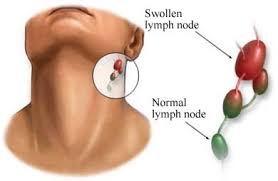Small in size and kidney shaped, lymph nodes are the organs of the lymphatic system. The highest concentration of lymph nodes is in the groin and armpit regions. Lymph vessels take lymph fluid throughout the body by taking it through the network of lymph nodes. These small structures work as filters and help get rid of harmful substances. They work this way mainly because they contain immune cells that attack germs to prevent infections. While they are fighting an infection, it is normal for lymph nodes to swell. Swollen lymph nodes in the neck are not uncommon, but you may want to see your doctor if they stay swollen for long.
What Causes Swollen Lymph Nodes in Neck?
 Lymph nodes are located near the surface of your skin and throughout your body.You can feel them on either side of your neck, under the jaw, in the armpits, above the collarbone and on either side of the groin. You may develop swollen lymph nodes in neck if you have a cold or sore throat. These nodes may also swell because of an injury, such as a bite or cut near the gland. Sometimes, your swollen lymph nodes in the neck indicate an infection or tumor in the head, mouth, or neck.
Lymph nodes are located near the surface of your skin and throughout your body.You can feel them on either side of your neck, under the jaw, in the armpits, above the collarbone and on either side of the groin. You may develop swollen lymph nodes in neck if you have a cold or sore throat. These nodes may also swell because of an injury, such as a bite or cut near the gland. Sometimes, your swollen lymph nodes in the neck indicate an infection or tumor in the head, mouth, or neck.
Since the lymph nodes are usually no bigger than half an inch, you may not be able to feel them under normal circumstances. They protrude a bit when swollen, and that is when you can feel them with more ease. They can swell and become twice as large as their normal size.
A change in their size is definitely a sign of swelling, but you may also notice other symptoms as well. For instance:
- You will notice pain or tenderness when pressing on them
- You may have sore throat, fever, and mouth sores
- You may notice warmth and redness around the skin of your swollen lymph node
- You may also notice a lump
It is important to note that swollen lymph nodes that are tender and softer to touch are usually sign of inflammation or infection. These swollen nodes move easily as well. On the other hand, a hard lymph node that does not cause pain and is difficult to move may indicate something serious and should be evaluated by a healthcare provider.
When to See a Doctor
As mentioned, you should see your doctor if your lymph node is hard to touch and maintains its place. Also, talk to your doctor if swelling does not go away or return.
Go to see your doctor about swollen lymph nodes in neck if they:
- Have swollen for no apparent reason
- Continue to grow big and persist for more than a couple of weeks
- Feel rubbery and hard
- Are accompanied by sore throat and other symptoms such as night sweats, fever, and unexplained weight loss
How Long Will Lymph Nodes Remain Swollen?
Every situation is different, but the swelling usually stays even after the infection has cleared. This is usually the case in children and their glands stay visible for several weeks after the infection. You can accelerate recovery by taking certain steps.
Lifestyle and Home Remedies
You can try some home remedies if your lymph nodes are painful and feel tender to touch.
- Apply warm compress to reduce swelling. Simply soak a washcloth in hot water, wring it out, and apply to the affected area for a few minutes.
- Take pain relievers to reduce pain and swelling. OTC pain relievers such as ibuprofen, aspirin, and acetaminophen such as Tylenol work quite well. These pain relievers reduce fever and pain. Be sure to consult with your doctor before giving aspirin to your child because it increases the risk for Reye's syndrome in children.
- In addition to these steps to treat swollen lymph nodes in neck, you need to take plenty of rest and give your body time and some energy to fight with infections. Once the infection is no longer there, your lymph nodes will return to normal.
What About Multiple Swollen Lymph Nodes?
Sometimes, you notice swollen lymph nodes in more than one area. Called generalized lymphadenopathy, the condition is usually caused by one of the following issues:
- It may happen due to a viral illness such as rubella, measles, mumps, or chickenpox.
- It may be due to mononucleosis that results in sore throat, fever, fatigue, and cytomegalovirus.
- It may be due to a bacterial illness, such as Lyme disease or strep throat.
- It may happen as a side effect of Dilantin, a medicine you need to take to treat seizures.
- It may also be the side effect of MMR vaccination.
- It may happen due to cancer, such as Hodgkin's disease, leukemia, and non-Hodgkin's lymphoma.
- It may happen due to a sexually transmitted infection, such as Syphilis.
- It usually happens when you have AIDS and the HIV virus attacking your immune system.
How to Treat
Treatment for swollen lymph nodes in neck or in other body parts usually depends on what causes swelling in the first place. If the swelling is due to a bacterial infection, you will have to take antibiotics to treat it. Viral infection usually goes away on its own. If it is due to cancer, your doctor will first perform a biopsy to confirm the diagnosis and then determine the best treatment option.
